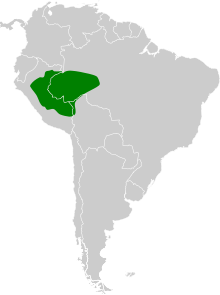
The rufous-tailed jacamar is a near-passerine bird which breeds in the tropical New World in southern Mexico, Central America and South America as far south as southern Brazil and Ecuador.
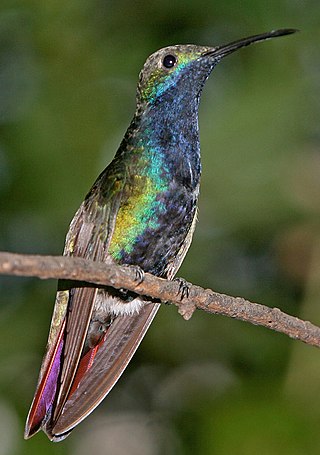
The black-throated mango is a species in subfamily Polytminae of the hummingbird family Trochilidae. It is found in Panama, in every mainland South American country except Chile, and in Trinidad and Tobago.
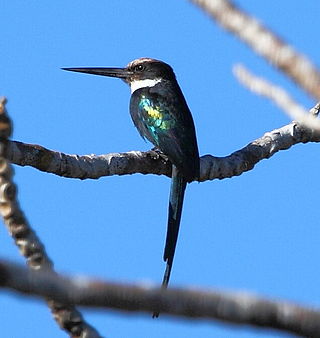
The paradise jacamar is a species of bird in the family Galbulidae. It is found in Bolivia, Brazil, Ecuador, French Guiana, Guyana, Peru, Suriname, and Venezuela.

The collared inca is a species of hummingbird found in humid Andean forests from western Venezuela through Colombia and Ecuador to Peru. It is very distinctive in having a white chest-patch and white on the tail. Like other hummingbirds it takes energy from flower nectar, while the plant benefits from the symbiotic relationship by being pollinated. Its protein source is small arthropods such as insects. It is normally solitary and can be found at varying heights above the ground, often in the open.

The violet-throated starfrontlet is a species of hummingbird in the "brilliants", tribe Heliantheini in subfamily Lesbiinae. It is found in Bolivia and Peru and possibly Ecuador.

The rufous-throated sapphire is a species of hummingbird in the "emeralds", tribe Trochilini of subfamily Trochilinae. It is found in Bolivia, Brazil, Colombia, Ecuador, the Guianas, Peru, Venezuela and possibly Argentina and Paraguay.

The rufous-vented ground cuckoo is a Vulnerable species of cuckoo in the tribe Neomorphini of subfamily Crotophaginae. It is found in Bolivia, Brazil, Colombia, Costa Rica, Ecuador, Nicaragua, Panama, and Peru.

The rufous-necked wood rail is a species of bird in the subfamily Rallinae of the rail, crake, and coot family Rallidae. It is found in Mexico, Central America, seven mainland South American countries, and Trinidad.

The white-throated jacamar is a species of bird in the family Galbulidae. It is found in Bolivia, Brazil and Peru.

The dusky-backed jacamar is a species of bird in the family Galbulidae. It is found in Colombia and Panama.
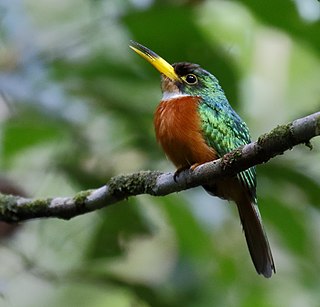
The yellow-billed jacamar is a species of bird in the family Galbulidae. It is found in Brazil, Colombia, Ecuador, French Guiana, Guyana, Peru, Suriname, and Venezuela.
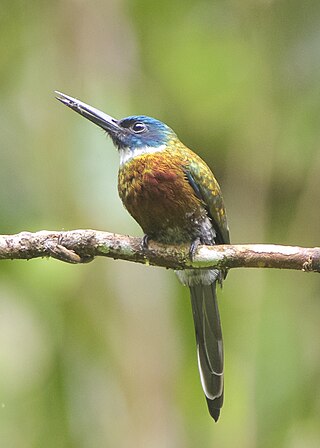
The purplish jacamar is a species of bird in the family Galbulidae. It is found in Brazil, Colombia, Ecuador, and Peru.
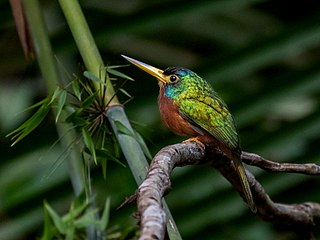
The blue-necked jacamar or blue-cheeked jacamar is a species of bird in the family Galbulidae. It is found in Brazil, Bolivia, and Peru.

The green-tailed jacamar is a species of bird in the family Galbulidae. It is native to Brazil, Colombia, French Guiana, Guyana, Suriname, and Venezuela.
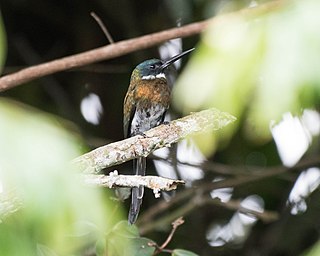
The bronzy jacamar is a species of bird in the family Galbulidae. It occurs in Bolivia, Brazil, Colombia, French Guiana, Guyana, Suriname, and Venezuela.

The coppery-chested jacamar is a species of bird in the family Galbulidae. It is found in Colombia, Ecuador and Peru.
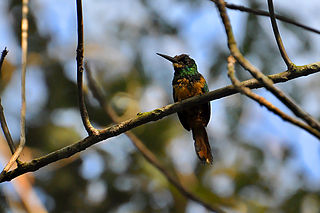
The white-chinned jacamar is a species of bird in the family Galbulidae. It is found in Brazil, Colombia, Ecuador, and Peru.
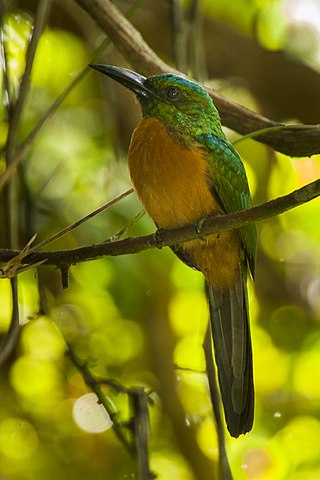
The great jacamar is a species of bird in the family Galbulidae. It is placed in the monotypic genus Jacamerops. It is found in Bolivia, Brazil, Colombia, Costa Rica, Ecuador, French Guiana, Guyana, Panama, Peru, Suriname, and Venezuela, where its natural habitat is subtropical and tropical moist lowland forests.

The white-throated woodpecker is a species of bird in subfamily Picinae of the woodpecker family Picidae. It is found Bolivia, Brazil, Colombia, Ecuador, and Peru.

Galbuli is one of the two suborders of the order Piciformes. It includes two families, Bucconidae (puffbirds) and Galbulidae (jacamars), both restricted to the Neotropics.

